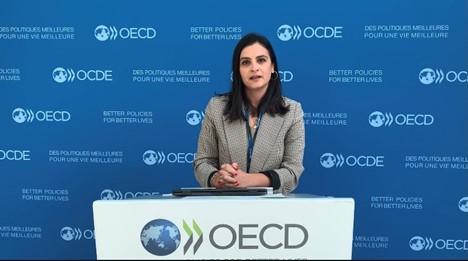Meet the CCRI stakeholders: Organisation for Economic Co-Operation and Development (CCRI Strategic Partner)
Published on 23.11.2023
An interview with Oriana Romano, Head of Unit, Water Governance and Circular Economy in Cities at the OECD Centre for Entrepreneurship, SMEs, Cities and Regions.

What potential do you see in the CCRI and how do you see your role as a Strategic Partner?
The OECD Programme on the Circular Economy in Cities and Regions will assist local and regional governments in designing and implementing policies allowing the transition from a linear to a circular economy in a shared responsibility with national governments, with a strong focus on the governance framework conditions required for the transition.
Based on your experience, what are the main challenges and opportunities faced by cities and regions? How do you plan to use your experience to support governance to boost circular economy at the local level?
According to the OECD report on The Circular Economy in Cities and Regions (2020), only 10% of surveyed cities and regions (out of a sample of 50, including 38 from Europe) consider themselves at an “advanced” stage in their circular economy transition, while 39% report to be “in progress”, and 57% consider themselves “newcomers”. Moreover, [while] cities and regions recognise the existence of technical solutions to apply life cycle management, reduce waste and material use, improve resource efficiency and transform waste into resources, the governance conditions to put these solutions in place are still lacking: from regulation, to financing, to stakeholder engagement for just and inclusive policies. These findings show the need to support cities and regions in their transition towards the circular economy, identifying the enabling conditions for creating new business models and collaborations across municipalities, regional governments and business.
What actions do you plan to take as part of the CCRI in 2023 to help cities/regions shift towards new, innovative governance models, and further foster stakeholder engagement?
- Strengthen the role of cities and regions as promoters, facilitators and enablers of the circular economy, in line with the OECD Checklist for Action, published in the 2020 report.
- Identify and share knowledge, best practices and lessons to cope with challenges and identify effective solutions and policies for the transition towards a circular economy across cities and regions, through policy forums to enhance peer-learning, surveys to collect and produce data and evidence, and state-of-the-art literature review. To that effect, the OECD Roundtable on the Circular Economy in Cities and Regions, a multi-stakeholder network gathering 100+ cities, regions and institutions will be mobilised.
- Provide and apply a measurement framework for decision-making and evaluation of local and regional circular economy strategies, based on the OECD Scoreboard on the Governance of the Circular Economy [and in cooperation with CCRI stakeholders], to assess existing enabling conditions for a circular economy, identify challenges and set priorities towards a more effective, efficient and just circular economy transition.
To find out more about the OECD, visit their profile on our website.

large 500 000-200 000, medium 200 000-50 000, and small cities 50 000-5 000
predominantly urban regions, intermediate and predominantly rural regions, refer to TERCET typology NUTS 3 region



